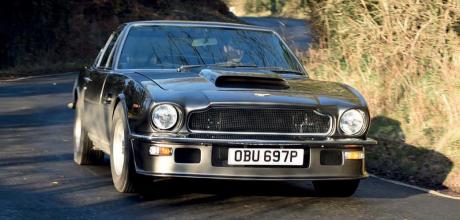1976 Aston Martin V8 Vantage Evolution upgraded 6.0-litre V8, fuel injection and modern 6-speed transmission
With its V8 now to six litres and featuring fuel injection plus a modern six-speed gearbox and beefed-up suspension, this 1976 AM V8 Saloon is a modern interpretation of an always popular classic Aston Martin.
EVOLUTION OF THE SPECIES
WORDS & PHOTOGRAPHY PAUL WALTON
AM V8 VANTAGE EVOLUTION
With its upgraded 6.0-litre V8, fuel injection and modern transmission, Aston Workshop’s Evolution specification has reinvented the AM V8 model. We drive its Cumberland Grey prototype
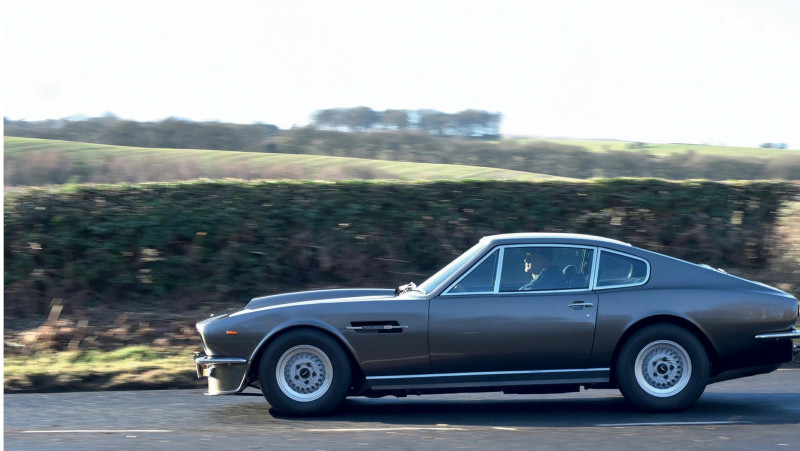
The Cumberland Grey AM V8 Saloon James Bond uses in the 1987 film, The Living Daylights, might have featured more weapons than the Wile E. Coyote uses to try and capture the Road Runner, but the many upgrades made by Aston Workshop to this similar-looking example make them look a bit pointless by comparison.
“What I like most about the car is how the updates work with the original design”
Cumberland Grey might be the same colour as 007’s car but thanks to the increased capacity of its V8, plus the addition of fuel injection and sharper suspension, it’s a very different animal. Faster, sharper, and more driver-focused, Bond wouldn’t need a rocket to escape the KGB if MI6’s Q Branch had given him this example.
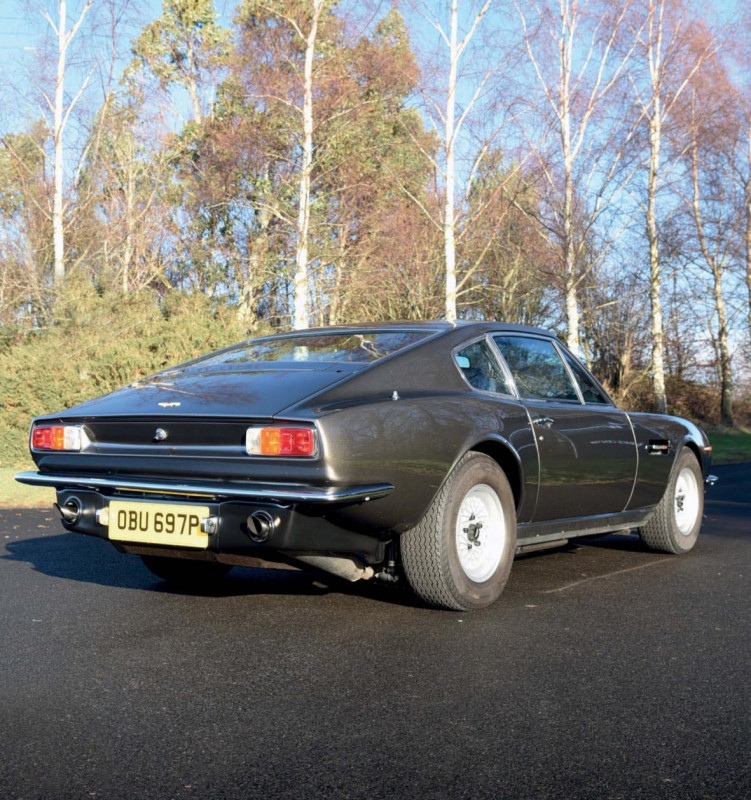
The AM V8 in question began life as a left-hand-drive 1976 Series 3 Saloon in Tankard Grey that was originally exported to Japan but later bought by a British expat for his Florida residence. As a longstanding customer of Aston Workshop, he asked the County Durham specialist to ‘sex up’ his car.
Aston Workshop’s first job when it arrived in 2019 was to assess the car’s condition, which senior technician, Keith Slater, now describes as ‘solid’. It was then fully stripped and the body taken back to bare metal before being resprayed in the same shade of Cumberland Grey as Bond’s Aston. But due to extra metal flakes being added to the paint, when the weak winter sun on the day of my visit to Aston Workshop finally makes an appearance, it results in the car having a noticeably warmer and bronzier sparkle than normal.
A set of 15in BBS alloys as fitted to the Oscar India generation of AM V8 from 1983 onwards replaced the original GKN alloys which were then shod with slightly wider 225/70 tyres. Together with a deep chin spoiler from a Vantage results in the car having more of a strong, muscular appearance than a standard model of this age.
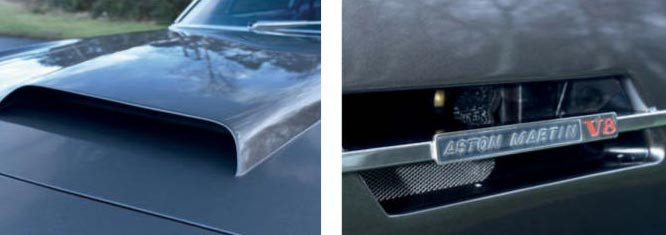
Apart from the dashboard needing to be retrimmed in black leather, the rest of the interior was deemed good enough to be left alone.
The original 5.3 V8 was retained but its capacity increased to 6.0 litres, the crankshaft and stroke were kept but new pistons were added and the bore increased. Aston Workshop replaced the carburettors that were fitted to all AMV8s between 1973 and 1986 with modern electronic fuel injection plus individual Jenvey throttle bodies which, thanks to being neatly packaged in the huge original airbox, means when I lift the huge bonnet, the engine appears to be largely standard.
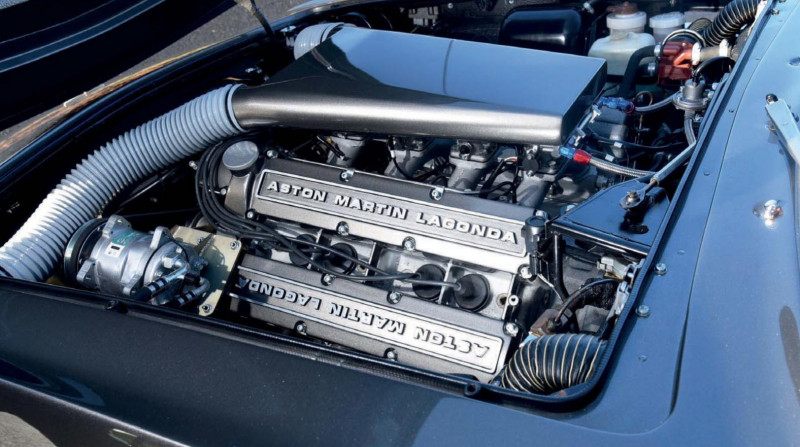
Together with the cylinder head being ported and polished, these modifications have resulted in the engine now producing 430bhp, around 130bhp over standard.
With an approximated 0-60mph time of a mere 5.5 seconds, these figures make even the heat-seeking missiles in Bond’s car start to look a bit pathetic by comparison.
Chrysler’s sluggish TorqueFlite three-speed automatic transmission, that the car was originally fitted with, was swapped for the same variety of Tremec six-speed manual as fitted to the DB7 Vantage.
This was combined with a custom-made propshaft but the `fully refurbished with new bearings and mountings. “The diff cradle is a common weak-spot,” explains Calvert, “so it’s been strengthened to deal with the extra power.”
The suspension has also been beefed up to cope with the increased performance that included Spax coilovers and a thicker front anti-roll bar while telescopic dampers, again sourced from Spax, replace the factory-fitted lever arms at the rear. Stopping power is courtesy of six-piston calipers in aluminium and grooved discs that improve braking. Christened the ‘V8 Evolution’ by Aston Workshop, the result is a handsome, well-balanced, and perfectly presented car that, thanks to the sympathetic nature of the upgrades, doesn’t look too different from a standard example. Cumberland Grey perfectly suits the AM V8’s square-edged design and, the Bond connection aside, it’s easy to understand why the colour is now as popular for owners as Silver Birch is for the DB5.
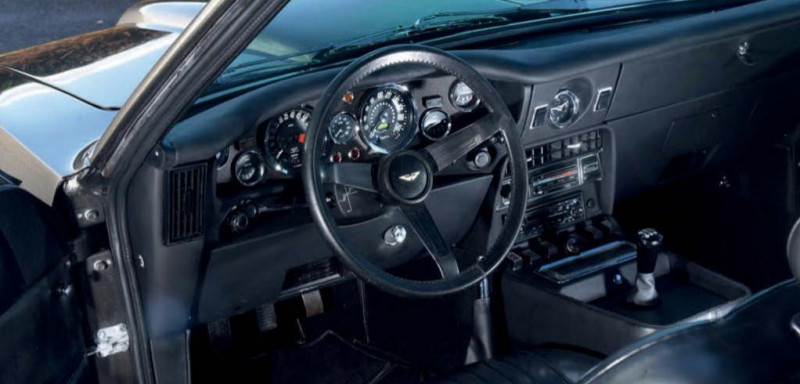
With its big, squishy, leather-upholstered seats, the interior hasn’t lost the model’s famed comfort. I might be sat on the other side of the car, but the slightly chaotic layout of the dashboard is identical to the Vantage prototype I tested in issue four of AMD that originated from the same era as this one.
It’s only when I turn the key and fire that huge lump sitting a metre or so ahead of me does the car’s now harder personality start to make itself known. Like a crouched leopard preparing to chase down a gazelle, I can feel that the engine is ready to go, its mammoth size causing the body to rock ever so slightly from side to side on tickover. It sounds slightly louder too, despite the standard twin exhaust pipes being retained.
After easing the stiff transmission into first and releasing the clutch, the engine requires little throttle to propel the car forwards with a hard, confident swagger. The engine feels much stronger than a standard 5.3 unit, the fuel injection making it more responsive. Together with the short ratios of the Tremec unit, this results in an urgency to the acceleration not usually felt in an Aston of this vintage, even a Vantage, and it needs little effort to thunder down the road like a dark grey tornado.
The stiffer suspension means it doesn’t ride quite as smoothly as a standard model, but the pay-off is it feeling much more composed through corners. By suffering from little body roll and the refreshed power steering feeling sharp and accurate, bends can be attacked with vigour rather than carefully negotiated like normal.
One thing that hasn’t changed is the car’s weight and size, which I’m always aware of. Together with that extra power it needs my full concentration at all times, meaning I don’t find it the easiest or most relaxing of drives. Despite the fat tyres are still able to find plenty of grip in the wet, greasy conditions on this cold winter’s day, the car’s often squirrelly nature means if I don’t treat it with respect, it won’t be James Bond that I look like when I’m towed out of a ditch, but that incompetent coyote.
Thankfully, the uprated brakes do a sterling job at bringing this uncompromising beast to order. Strong yet progressive, I’m both amazed and grateful how much speed they can quickly scrub off as I approach a tight bend. But with so much power at hand, after braking and then snicking the ‘box down to third, when I squeeze the throttle after negotiating the corner, the car again accelerates with sudden and uncompromising ferociousness. Yet despite its power, what I like most about the car (which is now for sale through Aston Workshop) is how the updates work in perfect harmony with the original design. The basic chassis, for example, might have been designed in the Sixties for the DBS from 1967, but it copes well with the extra performance and doesn’t feel like a preposterous, over-engined hot rod. Like the name implies, it really is an evolution of the AM V8.
Aston Workshop is now able to offer anything from similarly completed examples to individual upgrades or anything else owners, who are looking to ‘sex up’ their own AM V8, might want. Like a menu, they’re able to pick and choose the modifications that suit them and their needs.
One thing Aston Workshop won’t be offering, though, are heat-seeking missiles or jet power. Not because it can’t but because they’re not needed.
Thanks to: Aston Workshop (aston.co.uk)
“A deep chin spoiler from a Vantage results in the car having more of a strong, muscular appearance than a standard model of this age”
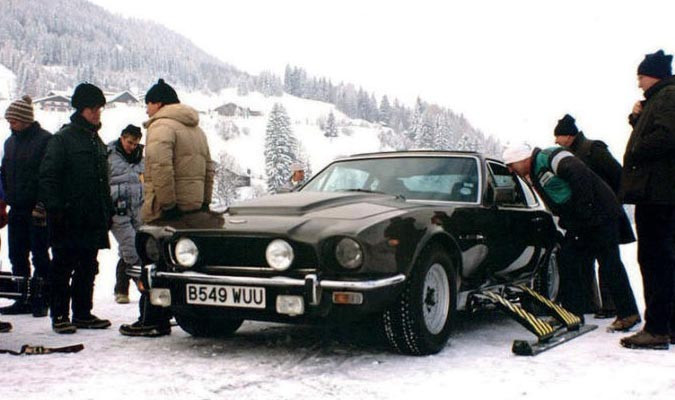
The Cumberland Grey AMV8 used in the 1987 Bond film, the Living Daylights


